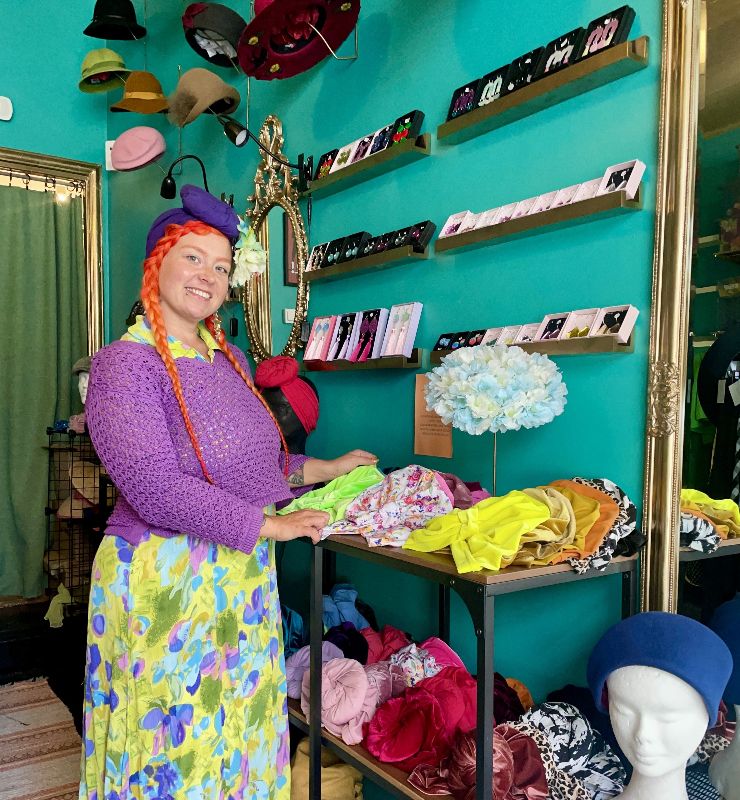Milliner, dressmaker
"Sewing requires precision, perceptive skills, good knowledge of materials and creativity. You also need knowledge of human nature and good interaction skills. Entrepreneurs must be systematic, tolerate pressure and be able to manage many different things at the same time."

- Eini Immonen
- Working as a milliner, dressmaker and sole trader at the firm Rubylea.
- Completed the vocational upper secondary qualification of dressmaker and the specialist vocational qualification of milliner at Stadi Vocational College.
- Eight years of work experience in the field.
Briefly explain what you do for a living.
I make different kinds of hats, other accessories and custom-made clothing and repair clothes. I also sell jewellery made by other artisans and vintage and second-hand products in my store.
How have you ended up in the profession of your choice?
I’ve been doing different kinds of handicrafts since I was a kid, and there are several artisans in our family. When I decided to get a new profession when I was 25, the handicraft sector felt the most natural. I first trained as a dressmaker. Then I decided to specialise in millinery, so that I could create full outfits and serve my customers in a more comprehensive manner.
Describe your typical working day or week.
My working days and weeks are very different. But I mainly spend my time on various sewing tasks, such as repairing hats and clothes and making products to order. I do a lot of hat and clothes patterns. In addition to sewing and pattern making, I serve customers in my shop and in social media, for which I regularly film new content. I also take pictures of products for my online shop and manage various administrative tasks, such as invoicing.
What kind of work environment or working hours do you have?
I work in my colourful shop in Vallila, Helsinki, where I both sell and manufacture the products. I also manage some office work and content production from my own couch at home.
I work four days a week. Sometimes I get carried away with my creative work, and instead of working for six hours as I intended, I end up working longer.
What kind of competence or qualities are required in the profession?
Sewing requires precision, perceptive skills, good knowledge of materials and creativity. You also need knowledge of human nature and good interaction skills. Entrepreneurs must be systematic, tolerate pressure and be able to manage many different things at the same time.
What is the best thing about your profession?
The best thing about working as an entrepreneur is the freedom to decide on your own working hours and working methods. I also like the fact that my working days vary and I have a versatile job description.
What are the downsides of the profession or what seems challenging?
You cannot always choose what kind of sewing you do, but you must also do tasks that you don’t like that much. The most challenging thing about entrepreneurship is making schedules and sticking to them. If you cannot outsource any of your tasks, as a self-employed person you have to carry out a wide range of duties, including cleaning, customer service, maintaining an online shop, marketing and photography. It is sometimes stressful, which is why you must be able to break down your work into smaller pieces. In addition, sometimes concerns about the company’s profitability cause stress.
What would you tell a person considering the profession of a milliner or dressmaker?
Craft entrepreneurship is creative and inspiring work where you can succeed with perseverance and products that stand out from the mass. In this profession, you must follow the prevailing fashion trends and be able to adapt.
How do you see the future of your profession?
Currently, you see many different kinds of hats in the fashion world, so I believe that the bulk of the population will start using more of them in the future. Demand for repair services is increasing because repairing clothes is more ecological than buying new ones. In addition, nowadays people appreciate handicrafts. So, I believe that there will be more work for us artisans in the future.
